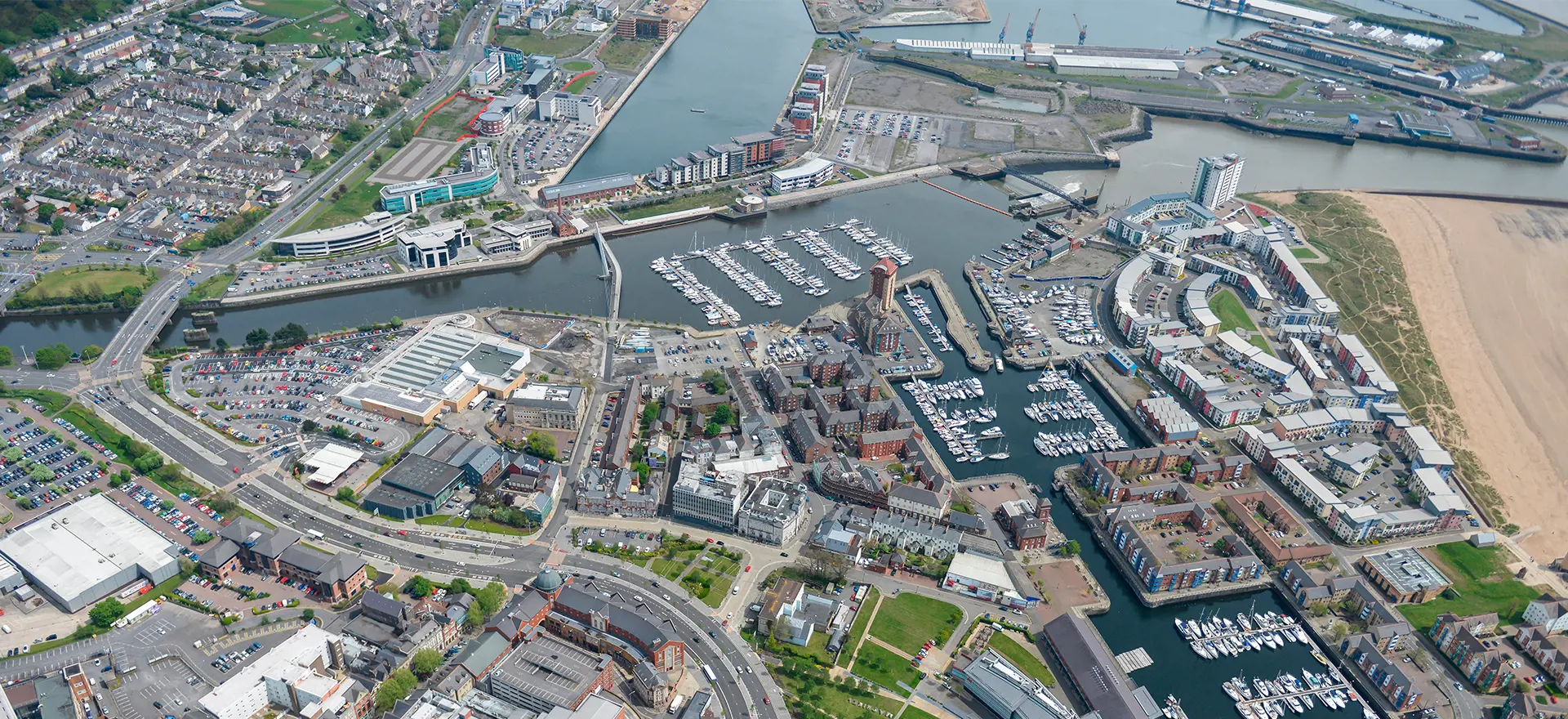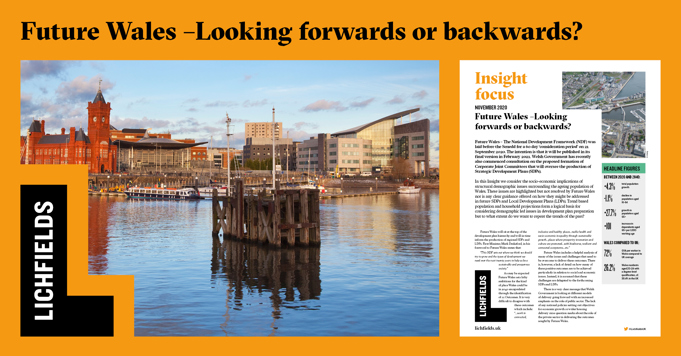Future Wales is due to be approved by the Senedd in 2021 and will then form the top tier of the development plan system in Wales. The draft document is strong on vision and identifies a series of positive outcomes such as: “A Wales where people live in distinctive regions that tackle health and socio-economic inequality through sustainable growth.” It is difficult to argue with these ambitions but the document is very light on how these outcomes are to be delivered.
Instead, the land use elements of these outcomes will need to be developed in forthcoming Local Development Plans (LDPs) and eventually in the Strategic Development Plans (SDPs) once the new Corporate Joint Committee governance arrangements are in place.
The policy approach to delivering more positive economic outcomes for Wales are to be led by Chief Regional Officers who will be responsible for delivering Regional Economic Frameworks. Future Wales states that SDPs should take strategic locational decisions on housing, economic growth, key services and essential infrastructure that will help support growth deals and Regional Economic Frameworks.
There is a logic to a strategic approach linked to the City Region and Growth Deals. The land use planning process has however already been left behind, particularly in SE Wales and the need for essential investment cannot be put on hold pending the production of SDPs which currently don’t even have a timescale. Previous experience of strategic planning in the UK demonstrates that this is not a straight forward process particularly where difficult political choices need to made that will see investment directed to one local authority ahead of another.
In the meantime there is an urgency to secure investment to address the very real current social and economic crises. The land use planning process must play a role in this process and we can’t await production of the SDP before we allow the necessary investment decisions to be made.
A new round of LDPs are in the early stages of production and have understandably been hampered by the limitations arising out of the Covid restrictions. In the absence of SDPs it is essential that we now push these plans forward quickly to provide the necessary framework for new investment decisions. These must include strategic allocations which are the proposals most likely to bring transformational benefits through their scale of investment and ability to deliver supporting infrastructure.
It must be remembered that plan making is not the end of the process and that new development will still need to secure planning permissions, discharge pre-commencement decisions and open sites up before the benefits of new development can be delivered. LDP preparation is due to be accelerated but is still likely to take 3 to 4 years. Lead-in time from submission of a planning application to first occupations can take a similar timescale for major sites. This means that, even with a fair wind, major sites currently being put forward as candidate sites may be at least six years away from delivery.
It is essential therefore that there is flexibility in the existing process to allow new development ahead of LDPs being adopted. PPW, Future Wales and existing LDPs provide a framework within which development proposals can be considered in the short term. The placemaking agenda has been at the heart of Welsh Government’s agenda and the need for all new development proposals to take account of the place making principles is reiterated in the Future Wales document.
It is important that we don’t bring down the shutters to new development in the short term and force investors away from Wales. My conversations with local planning authorities, particularly those with aging LDPs, indicate that there is a recognition of the social and economic benefits that new development brings and that we do need to consider windfall development of a suitable scale ahead of the next round of LDPs.
A recent appeal decision by the Minister for Housing and Local Government at Bedwellty in Caerphilly CBC [Minister’s letter ref:qA1399761] is a major cause for alarm by suggesting that new development should not come forward on greenfield windfall sites until the next round of LDPs are in place 3 to 4 years hence (and possibly longer in Caerphilly). The Minister refers in her decision letter to the reliance on a Plan-led system irrespective of the acceptance by the local authority that there is a lack of locally deliverable sites.
Welsh Government’s own research in the ‘Longitudinal Viability Study of the Planning Process’ (2017) acknowledges that existing plans have failed to allocate sufficient deliverable sites. Accordingly, deliverability has rightly become a key focus of the new plan making process. However, development, particularly housing delivery, is required in the short term.
Waiting on the next round of LDPs for new delivery also runs counter to Welsh Government own statement in ‘Building Better Places – Placemaking and the Covid-19 recovery’ (July 2020) that it will support decisions taken in the context of PPW and Future Wales where the LDP is silent or out of date.
Clarification is urgently required from Welsh Government that it will support well considered schemes that reflect placemaking principles in the short term and will not simply require the development industry to take a pause for 3-4 years until LDPs are in place. It is inconceivable that any other sector of the economy would be asked to stop production for several years whilst a new economic strategy is prepared.
It is clear that the focus in Future Wales is very much on the public sector leading transformational change in Wales. Policy 3 deals with public sector leadership in supporting urban growth and regeneration whilst Policy 7 sets out how the Welsh Government will increase delivery of affordable homes. There is, however, no policy dealing with market housing delivery or a national employment land strategy for Wales. There is in fact very limited policy reference to the positive role that private sector investment can play in delivering the ambitions of Future Wales.
Delivery of the positive socio-economic outcomes sought by Future Wales will require particular attention as we come out of the Covid-19 pandemic and face the uncertainty of a post-Brexit world. Whilst the role of a strong public sector will be important there is the real prospect of a tightening of public sector purse strings. It is therefore likely that major future investment will still need to be driven by private sector finance. This must be acknowledged in the way in which forthcoming LDPs and SDPs make land use allocations ensuring that sites are deliverable and where there are barriers that sources of public sector investment are clearly identified.
Many local authorities are starting to build essential new homes and this is welcomed. Unsurprisingly, given the length of time since they have played this role there is need to build up knowledge and capacity to deliver. It will be many years before local authorities are able to build “at scale and pace” as proposed by Future Wales and even then it is unclear what public sector resources will be available to fund this programme.
Increased public sector housing delivery should, in my view, be in addition to supporting increased delivery of market homes, and not in place of it. Private housing enables delivery of positive social and economic outcomes both directly through the delivery of somewhere to live and associated physical infrastructure but also in terms of investment by construction firms and then by the spending of new residents in local communities. Lichfields estimate that for every 100 homes built there is direct investment of over £13 million, c.220 direct FTE construction jobs, and £3 million in spending by new residents.
If we are to deliver the ambitious outcomes sought by Future Wales we need to start acting now. The way in which we consider and plan for develop does need to change and place making must be at the heart of this process. But there is a need to embrace these changes in the short term so that we start finding our way out of the economic and social turmoil that the combination of Covid-19 and Brexit has delivered. This is best addressed through constructive dialogue between the private and public sector about how delivery can happen now and not just in 6-8 years’ time.
I discuss these and associated issues in further detail in our insight focus:




